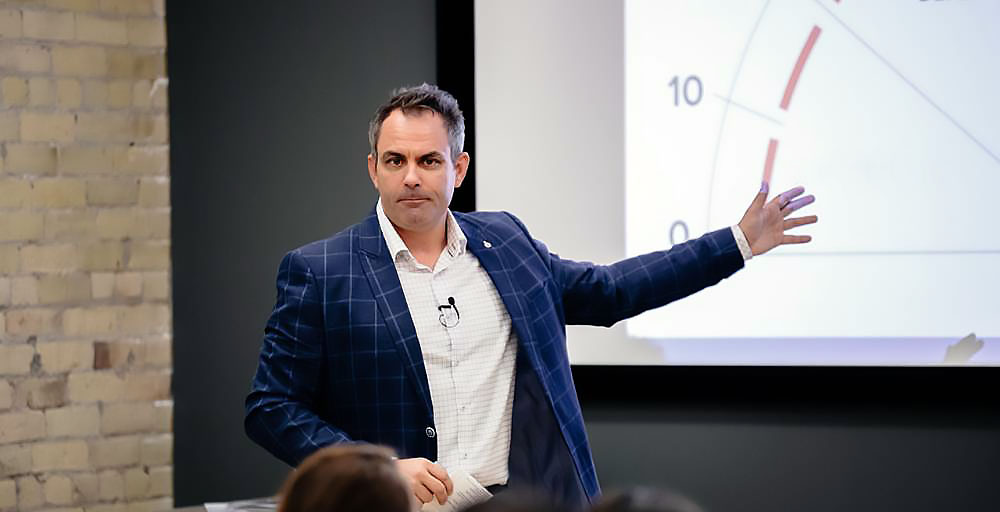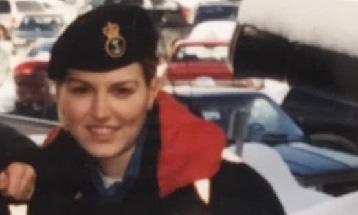
Col. (Retired) Mark Gasparotto
Mark spent 20 years in the Canadian Armed Forces before he released from service.
Here are five pieces of Col. (Retired) Mark Gasparotto advice:
1. Pay attention to choices you make that have long-term implications
Mark is a trained engineer. He spent his career sweating the details, whether he was leading the construction of Route Summit in Zhari / Panjwayi or commanding the 2 Combat Engineers Regiment at Petawawa. He paid similar attention to the life choices he made during his military and post-military careers.
Mark remembers his first decision with major financial implications: renewing his terms of service after his first five years in the Army. “I was a troop commander, sitting at my desk in Petawawa,” recalls Mark. “The Adjutant says, ‘Lt Gasparotto, you have a choice of a 20-year Intermediate Engagement, a 25-year, or not to sign.’”
“For me, it made no sense to sign up for the 25-year option, because I didn't know if I wanted to serve 25 years. So, I took the 20, knowing that—at the 20-year mark—I could convert and get the next contract. It’s fortunate that's what I did, because otherwise I would have had to return [pension] contributions.”
When it came time to apply for his pension years later, Mark again dug into the details. “I probably read those forms three times over to make sure I got it right just because of the money involved. No one will tell you whether you should pick an annuity or a lump-sum payment, which is probably one of the biggest, if not the biggest, financial decisions of your life.”
He didn’t assume anything about his finances. “I sent the pension bureau an email that said ‘Mark Gasparotto, service number 1234567, I want to know if I am X and I do Y, will I get Z’ and I got answers back, ‘Yes, that is correct.’ I didn’t make choices based on my best guesses. I got a physical email that confirmed if I was or was not correct, because I was making major life choices and my information had to be right.”
I was making major life choices and my information had to be right.
2. Be prepared to go to SCAN seminars and transition interviews
“Transition went well for me, but I took ownership. If you buy into an external locus of control, guess what? You’re going to go where the wind takes you. But if you ask the right questions, and if you follow the guidelines, you will get your pension on time and you will get your appointments.”
Veterans Affairs Canada (VAC) and the CAF recommend SCAN seminars and transition interviews for all releasing members. Mark went to his first SCAN seminar five years before his release, and a second one during his final year of service while he was home on leave from his posting with the United Nations in Haiti.
“The first seminar didn't have as much value for me as the second one because by then, you're really paying attention to the policies of the day; but I thought they were both good. The first seminar five years out gave me 80 percent of the solution to what I should think about. I got the remaining 20 percent when I made that final decision to release and got all kinds of information from the release section.”
3. Have regular conversations about your future with your family
When asked how much he involved his family in his transition, Mark is thoughtful. “I would say not as explicitly as I could have or should have. I worked for a general who told me that he would sit down with his wife every Christmas. He would say, ‘Okay, what do we want going forward?’ I never did it in such a systematic manner. I think my wife always knew that I would stay in until I was pensionable. After that, it was my choice. I mean, I knew what her preference was, but it was never, ever ‘you will or you must.’”
“There was more talk about moving. We knew we wanted to stay in Ottawa. That is why in the last nine years of my career, I moved, but the family didn’t move. That resulted in two imposed restrictions, whereby I went to the new duty station and the family stayed, and then one deployment of a year.”
The family’s planning about where it would stay long-term resulted in a stable base for their two kids and a sustainable career path for Mark’s spouse.
Mark asked his wife to join him for his VAC transition interview. He came armed with specific questions about the Education and Training Benefit, for which he wanted to apply. For other appointments, “I’d give her the lowdown when I’d get back. There's a large volume of information, and I think in the end spouses want to know, ‘What does this mean for us?’”
I worked for a general who told me that he would sit down with his wife every Christmas. He would say, ‘Okay, what do we want going forward?’
4. You have the right and personal responsibility to plan ahead
“There's an assumption in the Forces that everyone who joins is going to spend 35 years. We front-end load all sorts of training on people with that assumption. We produce very good soldiers, but, man, they’re expensive.”
When Mark was a commanding officer, he made a habit of having regular conversations with his career managers, the different directors, and those who served under him. He wanted to find out what they wanted and try to align the needs of the men and women with the needs of the service. “If you can get alignment institutionally and personally, everyone’s going to win.”
Mark continues, “I think people don't necessarily trust talking about what transition can look like. I heard one senior officer say, ‘If you’re thinking about getting out, don't tell me because there’s nothing good I can do with that information.’ That’s [expletive]. It makes no sense to me why you would not want to know what your people are thinking, because then you’re choosing them for jobs that may be completely inappropriate.”
“There's also this assumption that if you get out before your retirement age, you’re somehow quitting. I feel no guilt getting out at the 20-year mark, but I know others who have been made to feel that it was a selfish choice. When you're in, you need to be fully in and serve unconditionally. When it is your time to move on, for whatever your reasons, then don't linger. We need some people to stay for 35 years. We need some people to get to the rank of General or Chief Warrant Officer, but it's not for everyone.”
5. Keep track of your files, both in paper and electronically with a My VAC Account
Mark conducts most of his business with Veterans Affairs Canada via his My VAC Account. He signed up as part of his out-clearance process from the military. “I find if you're not in a rush, it's the best way to get information. In fact, I like the way they track information on the My VAC Account. You can see where your applications are. You don't always know what ‘In Progress” means but you know what you've uploaded.” Mark continues, “Now, if you're not technologically competent, then you're not going to get the most out of that site but if you're independent and don't mind that electronic transfer of information, it’s the best option.”
Mark also has detailed paper files of everything he read or signed related to his contracts, financial choices and transition. He printed and filed the CANFORGEN that explains how to avoid pension delays, and the checklist document from his unit’s release section.
Mark says that he was comfortable that his early planning helped set him on the right path. “I'm almost as certain as I can be that that was the right choice. I loved my time in uniform and would do it all again. That said, there has not been a single morning since releasing where I have woken up saying, ‘Man, I wish I were riding the bus to NDHQ in those [expletive] wool pants.’ Not once.”
Mark’s advice to those who have yet to transition
- Pay attention to things that will impact you long-term.
- Go to at least two SCAN seminars, including one at least five years before you think you might release.
- Have regular conversations about your future with your family.
- It’s your life. Don’t let anyone make you feel uncomfortable about planning and asking questions.
- Keep track of your files, both in paper and electronic with a My VAC Account.
Date published: 2018-10-10
Sources: Col. (Retired) Mark Gasparotto




